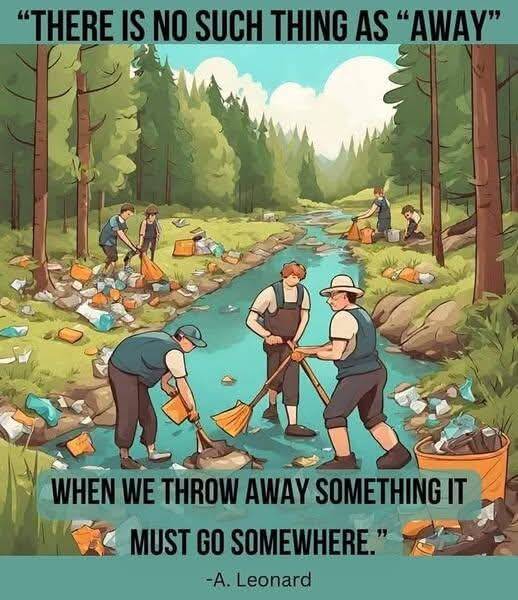
When we discard something, do we ever stop to think about where it truly goes? Annie Leonard’s powerful statement, “There is no such thing as ‘away.’ When we throw away something, it must go somewhere,” challenges us to confront the reality of our waste and its impact on the world around us.

This poignant image captures a team of people cleaning up a polluted stream, surrounded by forests that should be pristine and teeming with life. Instead, plastic bags, bottles, and other debris mar the natural beauty of the scene. While these individuals’ actions are commendable, the larger question looms: how did it get to this point?
The Illusion of “Away”
Modern convenience has lulled us into a false sense of separation from the consequences of our waste. When trash leaves our homes, it doesn’t magically disappear. It ends up in landfills, waterways, or worse, infiltrates ecosystems where it poses risks to wildlife and contributes to environmental degradation.
For example, discarded plastic can break down into microplastics that enter our water systems, ultimately making their way into the food chain. The “out of sight, out of mind” mentality only shifts the burden of responsibility to someone or something else.
The Ripple Effect of Waste
The image highlights the human effort required to undo the damage of careless waste management. Every bottle fished out of the stream represents hours of labor, but even more importantly, it represents a preventable mistake. The interconnectedness of our actions means that waste we produce has far-reaching consequences — environmentally, socially, and even economically.
A Call to Action
We all have a part to play in ensuring waste doesn’t devastate our planet. Here are a few ways to get started:
- Reduce: Cut down on single-use plastics and opt for reusable alternatives. Simple changes, like carrying a refillable water bottle or using cloth bags, can significantly reduce waste.
- Reuse: Before tossing an item, consider whether it can serve another purpose. Creativity and innovation can turn trash into treasure.
- Recycle: Educate yourself about your local recycling programs and ensure waste is disposed of properly. Contamination in recycling streams can undo even the best intentions.
- Advocate: Support policies and initiatives that prioritize sustainability, such as extended producer responsibility (EPR) schemes, which hold manufacturers accountable for the lifecycle of their products.
Community Efforts Matter
The individuals in this image remind us of the power of collective action. While systemic change is necessary, grassroots efforts, like community cleanups, foster awareness and inspire others to take responsibility.
If you’ve ever participated in a cleanup, you know it’s a humbling experience. The sheer volume of waste collected often paints a sobering picture of the challenges ahead, but it’s also a reminder that every small action matters.
Leaving a Legacy
The world we leave behind is shaped by the choices we make today. Do we want future generations to inherit landscapes littered with waste, or do we want them to experience the untouched beauty of nature? By acknowledging that “away” is a myth, we take the first step toward a more sustainable and mindful future.
What can you do today to ensure your waste doesn’t harm the world tomorrow?
Add comment
Comments